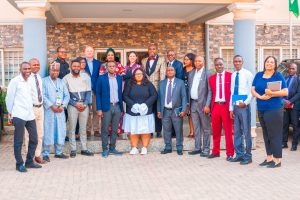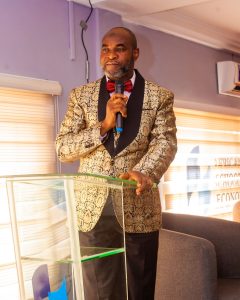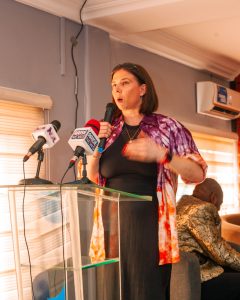
VC ATTRIBUTES ECONOMIC CHALLENGES TO GREED, SAYS TINUBU LEADING NIGERIA IN RIGHT DIRECTION

The Vice Chancellor of the African School of Economics (The Pan-African University of Excellence), Abuja, Prof. Mahfouz Adedimeji, has attributed the economic difficulties faced by many African nations to the selfishness of their leaders. He called for a shift in mindset that prioritizes addressing the needs of the majority over the desires of the few in power.
Prof. Adedimeji made this point during his address, “Between Need and Greed,” at the University’s 2nd Public Lecture on Thursday, February 20, 2025, at the University Auditorium. The lecture was presented by Susan HayesCulleton from Ulster University, Belfast, Ireland.
The Vice Chancellor emphasized that while many countries outside Africa have developed systems to meet the needs of their citizens, many African nations struggle with poor economic conditions caused by the greed and corruption of their leaders. He acknowledged that Nigeria is heading in the right direction, praising the recent economic reforms introduced by President Bola Ahmed Tinubu, noting that, despite their difficulties, they are showing results. He highlighted the appreciation of the naira in the forex market, the gradual rise in petrol costs, and the renewed sense of hope among the people.

The two-time Vice Chancellor lamented the growing desperation within Nigerian society for quick financial success. He expressed concern over this trend. “The focus of the youth should shift dramatically from interest in the primitive acquisition of wealth at the expense of moral values. Our society is becoming increasingly dangerous as a result of the appetitive avarice of the people, the young and the old. Recent developments about young people committing heart-shaking crimes of murder, ritual killing, and fraud have to be nipped in the bud through a systemic approach to human development. This is the approach that integrates the physical, educational, social, emotional, intellectual and cultural components to training people.”
Prof. Adedimeji further emphasized Ireland’s remarkable journey from a difficult past to its present success, showcasing resilience, adaptability, and significant transformation into a dynamic center for innovation, technology, and investment.
He also pointed out the importance of learning from other nations, particularly China, which, over the past month, introduced the new AI model, Deepseek, for public use, tested 6G internet, and prepared to launch a solar system in space that spans a kilometer and is ten times more efficient than conventional solar technology.
In her captivating lecture, “Economic Growth Models: The Irish Experience,” Ms. HayesCulleton examined a century of Irish history, detailing the transformations that have shaped the country across three generations. She discussed Ireland’s economic development, the significant effects of joining the EU, and the positive outcomes of investing in people, who she noted are Ireland’s most valuable resource.
The lecturer also addressed the impact of issues such as immigration, climate change, and Artificial Intelligence on economic productivity, social cohesion, and sustainable development.
The event was attended by notable figures, including the Ambassador of Ireland to Nigeria, Mr. Peter Ryan; the Pro-Chancellor of the African School of Economics, Princess Gloria Akobundu; and theVice-Chancellor of Al-Hikmah University, Ilorin, Prof. Noah Yusuf, who chaired the event.
How to Guarantee Nigeria’s Economic Growth – Irish Economist
A distinguished economist and associate lecturer at Ulster University in Northern Ireland, Susan HayesCulleton, has highlighted collaboration with others and strengthening the entrepreneurial capabilities of Nigerians as key strategies for driving Nigeria’s economic growth.
Ms. HayesCulleton shared this insight during the 2nd Public Lecture of the African School of Economics (The Pan-African University of Excellence) in Abuja, held on Thursday, February 20, 2025. Her lecture was titled “Economic Growth Models – The Irish Experience.”
The guest speaker emphasized that Nigeria’s economic growth holds great potential, particularly if the country learns from the experiences of others, enhances its businesses to ensure long-term sustainability, and collaborates to address the challenges of a changing global landscape while fostering international relationships.
She said, “The Irish people and the Irish business culture look outward and engage with their diaspora, and Nigeria has a huge capacity to do the same. They can also achieve this by enabling people to become proficient in Artificial Intelligence (AI) to enhance website development, e-commerce, and other business ventures. So there are plenty of opportunities for Nigeria to leverage its population and, of course, collaborate with Ireland for mutual benefit.”
The optimistic economist and author urged Nigerians to adopt AI in the development of sustainable energy solutions, advising them to enhance their skills in order to tackle emerging challenges.
According to her, “A significant challenge that we face as business leaders in relation to AI is twofold. First, energy consumption, we need to develop more sustainable energy sources to power AI operations. And second, we must ensure that people are adequately upskilled to manage and maximise the potential of AI.”
She stated that while AI is a recent development, it is crucial to build our capacity to train AI and integrate it into our businesses in a strategic and ethical manner. Additionally, she emphasized the importance of aligning technological progress with workforce productivity to benefit society as a whole.
Earlier in his address, tagged “Between Need and Greed”, the Vice-Chancellor of the University, Prof. Mahfouz Adedimeji, noted that the economic challenges facing the world oscillate between the needs of the majority and the greed of the minority. He said if greed can be eliminated among leaders, the needs of the people, which are basically food, cloth and shelter, would be met.
Prof. Adedimeji urged a shift away from the focus on material wealth at the cost of moral values, advocating instead for character development. He condemned the increasing occurrences of kidnapping for ransom, ritual killings, fraud, and other crimes among the youth.
To foster Nigeria’s economic growth, he recommended learning from the Irish experience and emphasized the importance of fostering a spirit of inquiry, collaboration, and innovation to drive economic advancement.
According to him, “For those who know, Ireland’s story is one of resilience, adaptation, and extraordinary transformation. Having emerged from economic challenges, the nation has redefined itself as a vibrant hub for innovation, technology, and investment.”

